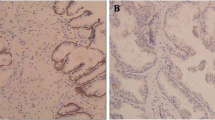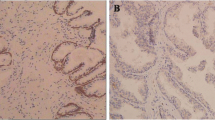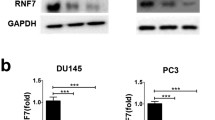Abstract
Cancerous inhibitor of protein phosphatase 2A (CIP2A) is a recently identified human oncoprotein that can stabilize some proteins by inhibiting degradation mediated by protein phosphatase 2A (PP2A), and its level in cancer is associated with resistance to chemotherapy. However, whether CIP2A could increase chemoresistance of prostate cancer (PCa) cells to chemotherapeutic agent cabazitaxel remains unclear. To determine whether CIP2A serves as a potential therapeutic target of human PCa, we utilized small interference RNA (siRNA) to knock down CIP2A expression in human PCa cells and analyzed their phenotypic changes. The data demonstrated that CIP2A was significantly elevated in mCRPC cell lines C4-2 and ARCaPM at both the mRNA and protein levels. CIP2A silencing led to decreased proliferation and enhanced chemosensitivity and apoptosis to cabazitaxel in human PCa cells, as well as reduced Akt phosphorylation. Our data suggesting critical roles of CIP2A in PCa cells chemoresistance to cabazitaxel and raising the possibility of CIP2A inhibition as a promising approach for chemosensitization of metastatic castration-resistant prostate cancer (mCRPC).





Similar content being viewed by others
References
Jemal A, Siegel R, Ward E, Hao Y, Xu J, Thun MJ. Cancer statistics. CA Cancer J Clin. 2009;59:225–49.
Ren SC, Chen R, Sun YH. Prostate cancer research in China. Asian J Androl. 2013;15:350–3.
Huggins C, Hodges CV. Studies on prostatic cancer: I. The effect of castration, of estrogen, and of androgen injection on serum phosphatases in metastatic carcinoma of the prostate. 1941. J Urol. 2002;168(1):9–12.
Suzman DL, Antonarakis ES. Castration-resistant prostate cancer: latest evidence and therapeutic implications. Ther Adv Med Oncol. 2014;6(4):167–79.
Lassi K, Dawson NA. Update on castrate-resistant prostate cancer. Curr Opin Oncol. 2010;22:263–7.
Tannock I, De Wit R, Berry W, Horti J, Pluzanska A, Chi K, et al. Docetaxel plus prednisone or mitoxantrone plus prednisone for advanced prostate cancer. N Engl J Med. 2004;351:1502–12.
Singh P, Yam M, Russell PJ, Khatri A. Molecular and traditional chemotherapy: a united front against prostate cancer. Cancer Lett. 2010;293:1–14.
de Bono JS, Oudard S, Ozguroglu M, Hansen S, Machiels JP, Kocak I, et al. Prednisone plus cabazitaxel or mitoxantrone for metastatic castration-resistant prostate cancer progressing after docetaxel treatment: a randomized open-label trial. Lancet. 2010;376(9747):1147–54.
Seruga B, Ocana A, Tannock IF. Drug resistance in metastatic castration-resistant prostate cancer. Nat Rev Clin Oncol. 2011;8(1):12–23.
Chen M, Nowak DG, Trotman LC. Molecular pathways: PI3K pathway phosphatases as biomarkers for cancer prognosis and therapy. Clin Cancer Res. 2014;20(12):3057–63.
Chen KF, Liu CY, Lin YC, Yu HC, Liu TH, Hou DR, et al. CIP2A mediates effects of bortezomib on phospho-Akt and apoptosis in hepatocellular carcinoma cells. Oncogene. 2010;29:6257–66.
Choi YA, Park JS, Park MY, Oh KS, Lee MS, Lim JS, et al. Increase in CIP2A expression is associated with doxorubicin resistance. FEBS Lett. 2011;585:755–60.
Thalmann GN, Anezinis PE, Chang SM, Zhau HE, Kim EE, Hopwood VL, et al. Androgen-independent cancer progression and bone metastasis in the LNCaP model of human prostate cancer. Cancer Res. 1994;54(10):2577–81.
Wu D, Zhau HE, Huang WC, Iqbal S, Habib FK, Sartor O, et al. cAMP-responsive element-binding protein regulates vascular endothelial growth factor expression: Implication in human prostate cancer bone metastasis. Oncogene. 2007;26(35):5070–7.
Pienta KJ, Smith DC. Advances in prostate cancer chemotherapy: a new era begins. CA Cancer J Clin. 2005;55(5):300–18. quiz 305-323.
Qu YY, Dai B, Kong YY, Ye DW, Yao XD, et al. Prognostic factors in Chinese patients with metastatic castration-resistant prostate cancer treated with docetaxel-based chemotherapy. Asian J Androl. 2013;15(1):110–5.
Petrylak DP, Tangen CM, Hussain MH, Lara Jr PN, et al. Docetaxel and estramustine compared with mitoxantrone and prednisone for advanced refractory prostate cancer. N Engl J Med. 2004;351(15):1513–20.
Seruga B, Tannock IF. Chemotherapy-based treatment for castration-resistant prostate cancer. J Clin Oncol. 2011;29(27):3686–94.
Keizman D, Maimon N, Gottfried M. Metastatic hormone refractory prostate cancer: recent advances in standard treatment paradigm, and future directions. Am J Clin Oncol. 2012;37(3):289–96.
Kao SC, Hovey E, Marx G. Second-line therapy for castrate-resistant prostate cancer: a literature review. Asia Pac J Clin Oncol. 2011;7(3):212–23.
Lheureux S, Joly F. Cabazitaxel after docetaxel: a new option in metastatic castration-resistant prostate cancer. Bull Cancer. 2012;99(9):875–80.
Wiegering A, Pfann C, Uthe FW, Otto C, Rycak L, Mäder U, et al. CIP2A influences survival in colon cancer and is critical for maintaining Myc expression. PLoS One. 2013;8(10):e75292.
Zhang S, Wang Y, Chen Z, Kim S, Iqbal S, Chi A, et al. Genistein enhances the efficacy of cabazitaxel chemotherapy in metastatic castration-resistant prostate cancer cells. Prostate. 2013;73(15):1681–9.
Acknowledgments
This study was supported by the grants from the National Natural Science Foundation of China (No. 81202036, 31471033)
Conflicts of interest
None
Author information
Authors and Affiliations
Corresponding authors
Additional information
Jinming Huang and Jiaoyuan Jia contributed equally to this work.
The Publisher and Editor retract this article in accordance with the recommendations of the Committee on Publication Ethics (COPE). After a thorough investigation we have strong reason to believe that the peer review process was compromised.
An erratum to this article is available at http://dx.doi.org/10.1007/s13277-017-5487-6.
About this article
Cite this article
Huang, J., Jia, J., Tong, Q. et al. RETRACTED ARTICLE: Knockdown of cancerous inhibitor of protein phosphatase 2A may sensitize metastatic castration-resistant prostate cancer cells to cabazitaxel chemotherapy. Tumor Biol. 36, 1589–1594 (2015). https://doi.org/10.1007/s13277-014-2748-5
Received:
Accepted:
Published:
Issue Date:
DOI: https://doi.org/10.1007/s13277-014-2748-5




